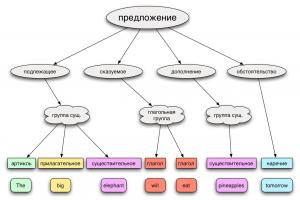Greek. Lesson 6: How to conjugate verbs
Today we begin to study one of the most difficult sections of Greek grammar - the section “verbs”. First we will study the conjugation of verbs in the present tense - it is not difficult. A little cramming, daily repetition of what you have learned, and in a month you will know the conjugation of the most commonly used verbs. These are the only ones I select for you. And in April we will begin to study times. This activity requires not only time, but also patience. When they started explaining to me all the rules for the use (and most importantly, education!) of tenses, I decided that I would not be able to speak Greek in the next five years. Then everything gradually became assimilated.
Let's start with an important verb - the verb "to have". In Russian we say “I have”, but in Greek instead of three words we use one: έχω
verb έχω (to have)
The basic form of verbs ends with the letter ω. Regular verbs are divided into two large categories: those in which the emphasis falls on the pre last syllable, as in έχω [‘echo] “I have” and θέλω [sel] “I want”, and those in which the stress falls on the last syllable, as in αγαπώ [agapo] “I love”.
The verb έχω is typical of the first category. In the present tense and active voice it conjugates like this:
έχω [‘echo] I have
έχεις [‘ehis] you have
έχει [‘ehi] she\he\it has
έχουμε [‘ehume] we have
έχετε [‘ehete] you have
έχουν [‘ekhun] they have
Please note that you do not need to use pronouns. Not “I have”, but simply “is”, “I have”. This is the peculiarity of the Greek language. The ending of the verb indicates who is being talked about. If ω, then it means “I have,” if ουν, then “they have.” Get used to it.
Language knowledge
Are you saying / are you saying...? Μιλάτε...
In Russian ρωσικά
In Greek ελληνικά
I don't speak Greek. Δε μιλώ ελληνικά.
Do you understand me? Με καταλαβαίνετε;
I don't understand you Δε σας καταλαβαίνω
I understand a little, but I can't speak. Καταλαβαίνω λίγο, αλλά δεν μπορώ να μιλήσω
What language do you know? Τι γλώσσα μιλάτε;
I know Μιλάω
English αγγλικά
German γερμανικά
French γαλλικά
You speak well. Μιλάτε καλά
I have no practice. Μου λείπει η πρακτική
I want to learn to speak Greek. Θέλω να μάθω να μιλάω ελληνικά.
Repeat one more time. Πέστε το άλλη φορά.
A little slower. Λίγο πιο αργά.
What does this word mean? Τι σημαίνει αυτή η λέξη;
Greek. Lesson 7: Conjugating the verb “to be”
In the last issue we talked about the verb “to have”, today we are learning to correctly use the forms of the verb είμαι. It can be used as a semantic verb in the meaning of “to be” and a linking verb in the meaning of “is”.
Ο φίλος μου είναι Έλληνας - My friend is Greek.
Verb conjugations:
I -(εγω) είμαι
You - (εσύ) είσαι
He - (αυτός) είναι
She (αυτή) είναι
We are (εμείς) είμαστε
You are (εσείς) είστε
They (m.) (αυτοί) είναι
They (female) (αυτές) είναι
Use:
Είμαι απο τη Ρωσία. - I'm from Russia.
Είμαστε απο την Κύπρο. – We are from Cyprus.
Past tense:
This verb has only one past tense form - the imperfect, which is used when in Russian we say “byl”, “byla”, “bylo”, “byli”.
Compare present and past tense forms |
|
The present | Past |
Είσαστε/είστε | |
Useful words
QUALITIES
1. Good - bad καλός - κακός
2. Beautiful - ugly όμορφος - άσχημος
3. Old - young γέρος - νέος
4. Old - new
παλιός – καινούργιος, νέος
5. Rich - poor πλούσιος - φτωχός
6. Familiar - unfamiliar
γνωστός - άγνωστος
7. Cheerful - boring
εύθυμος – ανιαρός, σκυθρωπός
8. Smart - stupid
έξυπνος – κουτός, ανόητος
9. Strong - weak δυνατός - αδύνατος
10. Big - small μεγάλος - μικρός
Greek. Lesson 8: Pronoun Forms and Verb Conjugation
Today we will continue the conversation about pronouns. They say that the most common word in almost any language is the word “I”. But this does not apply to Greek. Greeks (and Cypriots, naturally, too) practically do not use personal pronouns. They do not say “I see” “you see”, just “I see” (βλέπω), “you see” (βλέπεις).
You can guess who we are talking about by the form of the verb and the meaning of the sentence.
I still wrote the forms of personal pronouns for you. In brackets is what corresponds to our I, you. He she…. And next to it is written what will be most useful to you - forms accusative case. You will have to use these pronouns quite often.
Monosyllabic personal pronouns have the following accusative forms:
(εγώ) με Me (εμείς) μας us
(εσύ) σεYou (εσείς) σας you
(αυτός) τον His (αυτοί) τους theirs
(αυτή) την Her (αυτές) τις theirs
Monosyllabic personal pronouns in a sentence are placed immediately before the verb, for example:
Την ξέρω καλά. I know her well.
Σας παρακαλώ. I ask you.
Τον βλέπω. I see him.
Verbs
In Greek, as in Russian, verbs change according to persons, tenses, voices and moods. Verbs can be divided into two large groups:
1) Verbs of the first conjugation. Have stress on the penultimate syllable: μαθαίνω, διαβάζω
2) Verbs of II conjugation. Have stress on the last syllable: αγαπώ, μπορώ
Verbs of the first conjugation change according to persons in the present tense as follows:
Singular | Plural |
1 person (Εγώ) γράφω - I write | (Εμείς) γράφουμε - we write |
2nd person (Εσύ) γράφεις you write | (Εσείς) γράφετε - you write |
3rd person (Αυτός/αυτή) γράφει - he/she writes | (Αυτός/αυτές) γράφουν - they write |
Note: Pronouns are in parentheses because they are often omitted in colloquial speech.
Useful words
1) Long – short μακρύς –
κοντός (σύντομος)
2) Wide - narrow πλατύς, φαρδύς - στενός
3) High - low ψηλός - χαμηλός -κοντός
4) Light - dark βαθύς - ρηχός
5) Expensive – cheap ακριβός – φτηνός
6) Fast - slow γρήγορος - αργός
7) Light - heavy ελαφρύς - βαρύς
8) Soft - hard μαλακός - σκληρός
9) Thick - thin χοντρός - λεπτός
10) Clean – dirty καθαρός –
βρώμικος, λερωμένος
Greek. Lesson 9: Conjugating verbs in the present tense
In the last issue of the newspaper we learned the conjugation of the verb γράφω (to write).
Let's repeat.
γράφω [grapho] I write
γράφεις [graphic] you write
γράφει [graphics] he/she/it writes
γράφουμε [graphume] we write
γράφετε [graphete] you write
γράφουν [grafun] they write
In the previous lesson, we looked at the category of verbs that have stress on the penultimate syllable and are conjugated like the verb γράφω. In this lesson we will look at verbs of the second category, in which the stress falls on the last syllable and which are conjugated as the verb αγαπώ “I love”.
Remember that in Greek the present tense describes how actions are taking place in this moment, and repetitive actions, for example, “now I drink coffee” (continuous), “every morning I drink coffee” (simple). Both of these actions in Greek express the present tense, i.e. πίνω καφέ τώρα, πίνω καφέ κάθε πρωί.
Verbαγαπώ (I love)
Unit number
αγαπώ [ayapo] I love
αγαπάς [ayapas] you love
αγαπά [ayapa] he\she\it loves
Plural
αγαπούμε [ayapume] we love
αγαπάτε [ayapate] you love
αγαπόυν [ayapun] they love
The verb ζητώ “I ask, I seek” is conjugated like the verb αγαπώ
Verbμπορώ (I can)
A number of verbs ending in ώ as αγαπώ have other endings when conjugated. One example is the verb μπορώ (boro) "I can".
Unit number
μπορώ [boro] I can
μπορείς [Boris] you can
μπορεί [bori] he\she\it can
Plural
μπορούμε [borume] we can
μπορείτε [fight] you can
μπορούν [borun] they can
Παρακαλώ [parakalo] “I ask” is another verb, conjugated as μπορώ. It can be used as an equivalent to "please" or "pleased to oblige" in response to "thank you."
Unfortunately no easy way distinguish which of the verbs of this category ending in ώ is conjugated as αγαπώ, and which as μπορώ. Gradually you will remember them.
In the next lesson I will present you with a list of the most common Greek verbs(naturally, I selected exactly those that you can use immediately after reading the lesson).
Grechical Lesson 10: Verbs of the second conjugation. Exceptions to the rules
Verbs of the second conjugation are divided into two subgroups, and are conjugated depending on which subgroup they belong to:
1 subgroup (αγαπώ, αγαπάς) |
|
Singular | Plural |
1 person | |
2nd person | |
3rd person αγαπά (αγαπάει) | αγαπάν (αγαπάνε) |
2 subgroup (μπορώ, μπορείς) |
|
Singular | Plural |
1 person | μπορούμε |
2nd person | μπορείτε |
3rd person | μπορούν (μπορούνε) |
The method of changing the persons of verbs of the second conjugation must be remembered along with the meaning of the verb itself. In modern Greek dictionaries, after the verbs of the second conjugation of the first subgroup, there is usually the letter alpha (α) in parentheses, and after the verbs of the second subgroup, epsilon (ε).
If there are two verbs in your sentence, then most likely they are connected by the particle να.
Please note that (unlike Russian) their forms are the same.
Θέλω να διαβάζω καλά βιβλία.
Ξέρω να γράφω ελληνικά.
I can write in Greek.
If person or number changes, then the change occurs in both verbs:
Ξέρουμε να γράφουμε.
We can write.
Ξέρουν να γράφουν.
They can write.
Verbs 1 conjugation
λέω - speak, τρώω - eat, eat, ακούω - listen, κλαίω - cry, πάω - go are conjugated as follows:
Λέει λένε
In the last two lessons we looked at the rules for conjugating Greek verbs. Today you can add 20 new verbs to your dictionary.
Reading (system by L.V. Zankov) on the topic: “... the city of Kazan with an ethnocultural Russian component Goals lesson: Identify common motives and features of difference... meeting vizier - minister, advisor to the Sultan Rulesreading fairy tales: A fairy tale must be read in...
...)5417149 cellular telephone 89033416062 Lesson in literary reading(L.V. Zankov system) ... vizier - minister, adviser to the Sultan Rulesreading fairy tales: Should you read a fairy tale... a wizard in exchange for a lamp? Lesson in literary reading(L.V. Zankov system) on...
Lessons on the book “Letters about Goodness” in grades 1-11
LessonMethodological comment: In the organization lesson technique used READING WITH STOPS AND QUESTIONS BLOOM...etc. Don't remember hundreds rules
First group Α (first conjugation verbs, group 1)
Verbs in this group are stressed on the second syllable from the end and always end in -ω in the infinitive.
How to correctly conjugate type A verbs using the example of the verb κάνω= do
εγώ κάν ω ..................................................... ..I do
εσύ κάνεις .................................................you do
αυτός/ αυτή/ αυτό κάνει ...................he, she, it does
εμείς κάνουμε ................................................ we do
εσείς κάνετε ................................................you do
αυτοί/αυτές/αυτά κάνουν(ε) ........................they do
Verbs are conjugated in the same way:
ξέρω = I know
βλέπω = I look
διαλέγω = I choose
καταλαβαίνω= I understand
θέλ ω = I want
έχ ω = have
πίν ω = drink
κάν ω = I do
πληρών ω = crying
αγοράζ ω = buying
δουλεύ ω = working
αγκαλιάζ ω = hug
ικετεύω = I beg

Second group AB (first conjugation verbs group 2)
There are very few verbs in this group, they are very similar to the verbs of group A, the stress is also on the second syllable from the end and always end in -ω in the infinitive.
But the endings of these verbs are slightly different from the previous group. It is better to remember the verbs included in this group right away, in any case, there are not many of them:
πάω - to go, to go
λέω - to say
ακούω - listen, hear
τρώω - there is
κλαίω - cry
φταίω - to be guilty
To conjugate a verb, you need to replace the ending -ω with the ending corresponding to the pronoun.
πάω - (go, go)
Εγώ πάω - I'm coming
Εσύ πάς - You are coming
Αυτός / αυτή / αυτό πάει - He/she/it is coming
Εμείς πάμε - We are coming
Εσείς πάτε - You are coming
Αυτοί / αυτές / αυτά πάνε - They are coming
And let's immediately remember a few useful combinations:
πάω με το αυτοκίνητο - go by car
πάω με το αεροπλάνο - fly on an airplane
πάω με το πλοίο - sail on a ship
πάω με τα πόδια - walk
Πάμε στην ξενάγηση σήμερα το μεσημέρι. – We are going on an excursion this afternoon. (σήμερα το μεσημέρι – this afternoon)
Ο καιρός φταίει για την ακύρωση της πτήσης. – The weather is to blame for the flight cancellation. (η ακύρωση – cancellation, η πτήση – flight)
Τρως θαλασσινά προϊόντα; – Do you eat seafood? (τα θαλασσινά προϊόντα – seafood)
Ακούτε την ανακοίνωση; – Do you hear the announcement? (η ανακοίνωση – announcements e
As usual, kind, cozy and Greek spirit reigns in our lessons!
Group B1 (verbs of the second conjugation group 1)
Verbs in this group end in -άω in the infinitive with the emphasis on -ά. To conjugate a verb, you need to replace the ending -άω with the ending corresponding to the pronoun.
αγαπ ώ ή αγαπάω - to love
αγαπ άς
αγαπά ή αγαπάει
αγαπ άμε ή αγαπούμε
αγαπ άτε
αγαπ ούν(ε)
Pωτάω - to ask
Απαντάω - answer
Μιλάω - to speak
Γελάω - laugh
Χαιρετάω - say hello
Χαμογελάω - smile
Ζητάω - to ask
Φιλάω - to kiss
Φυλάω - to protect
Κοιτάω - watch
Χτυπάω - to beat, knock
Η Άννα μιλάει με τον υπάλληλο του τουριστικού γραφείου. – Anna is talking to a travel agency employee. (ο υπάλληλος - employee, το τουριστικό γραφείο - travel agency)
Στην δουλειά απαντάω στα γράμματα. – At work I answer letters.
Με βοηθάς να βρω το φαρμακείο; – Can you help me find a pharmacy? (το φαρμακείο – pharmacy)
Μιλάτε ελληνικά; – Do you speak Greek?

Group B2 (verbs of the second conjugation group 2)
Verbs in this group end in -ώ in the stressed infinitive. The endings themselves are almost no different from group A, but the emphasis always falls on the ending. To conjugate a verb, you need to replace the ending -ώ with the ending corresponding to the pronoun.
θεωρ είς
θεωρ εί
θεωρ ούμε
θεωρ είτε
θεωρ ούν
αργώ - to be late
μπορώ - to be able
τηλεφωνώ - to call
οδηγώ - to drive
συγχωρώ - to forgive
Αργούμε στο αεροδρόμιο. - We are late for the airport. (το αεροδρόμιο – airport)
Οδηγείς το αυτοκίνητο στο εξωτερικό; – Do you drive a car in a foreign country? (το αυτοκίνητο – car)
Τηλεφωνούν στην Πρεσβεία. – They call the Embassy. (η Πρεσβεία – embassy)
This is how we teach you remotely via Skype!
Verb group G1
This group includes verbs ending -ομαι:
έρχομαι - to come
κάθομαι - sit
σκέφτομαι - to think
σέβομαι - respect
Γίνομαι - to become
Σηκώνομαι - to rise
Φαίνομαι - to seem
Reflexive verbs:
Pλένω το παιδί. - I'm washing the baby. (πλένω – wash)
Πλένομαι. - I'm taking a shower.
To conjugate such a verb, you need to replace the ending -ομαι with the ending corresponding to the pronoun.
έρχ ομαι (to come)
Εγώ έρχ ομαι I'm coming
Εσύ έρχ εσαι You come
Αυτός / αυτή / αυτό έρχεται - He / she / it comes
Ε μείς ερχόμαστε - We are coming
Εσείς έρχεστε - You come
Αυτοί / αυτές / αυτά έρχονται - They come
Σηκώνομαι νωρίς. - I get up, I get up early. (σηκώνομαι – get up, νωρίς – early)
Ερχόμαστε εδώ κάθε καλοκαίρι. – We come here every summer. (έρχομαι - to come, εδώ - here, here, κάθε - every, το καλοκαίρι - summer)
Το Σαββατοκύριακο καθόμαστε έξω μέχρι αργά. - We're late on weekends. (, το Σαββατοκύριακο – weekend, αργά – late)
We practice our language skills weekly with native speakers completely free of charge!
Verb group G2
This group includes verbs ending -άμαι.
There are only 4 verbs in this group that need to be learned. Their endings are slightly different from the endings of group G1.
θυμάμαι - remember
φοβάμαι - to be afraid
λυπάμαι - to regret
κοιμάμαι - to sleep
To conjugate a verb, you need to replace the ending -άμαι with the ending corresponding to the pronoun.
κοιμάμαι - to sleep
Εγώ κοιμ άμαι - I'm sleeping
Εσύ κοιμ άσαι - You are sleeping
Αυτός / αυτή / αυτόκοιμάται - He/she/it is sleeping
Εμείς κοιμόμαστε - We are sleeping
Εσείς κοιμόσαστε - You are sleeping
Αυτοί / αυτές / αυτάκοιμούνται - They are sleeping
Κοιμάμαι μέχρι τις 9 το πρωί. – I sleep until 9 am. (κοιμάμαι – sleep, μέχρι – before, το πρωί – morning)
Φοβάται να πετάει. - He is afraid to fly. (φοβάμαι – to be afraid, να πετάει – to fly)
Λυπάμαι πολύ. - I'm really sorry. (λυπάμαι – regret, regret, πολύ – very much)
Με θυμάσαι; - Do you remember me? (με – me, θυμάμαι – remember)
Speech by our director at International Students Day!










